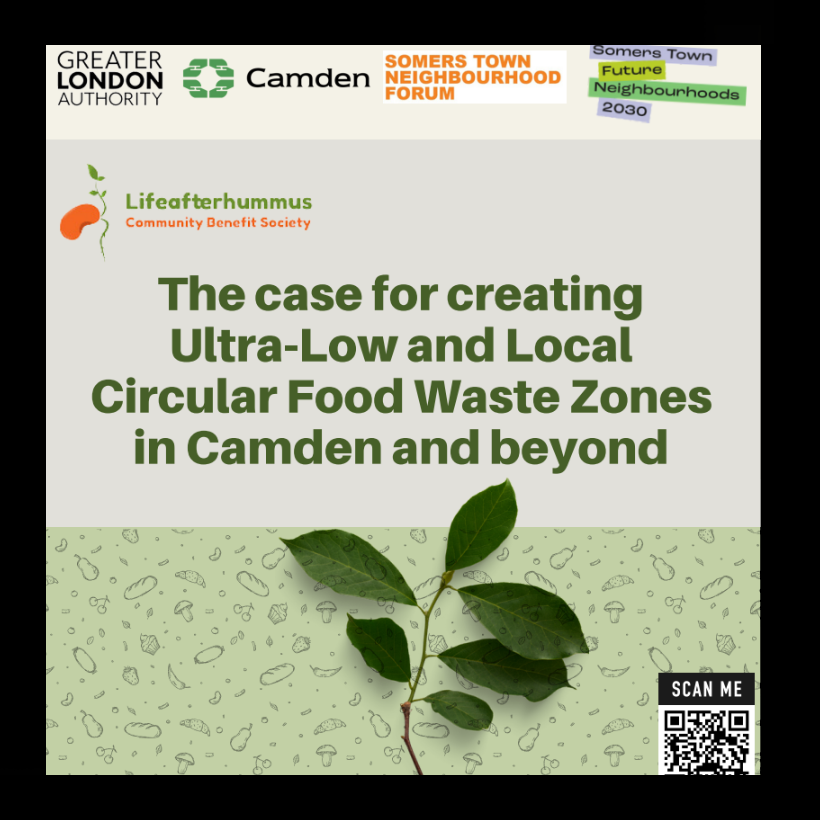Piloting Ultra-Low Food Waste Zones: The Case of Somers Town in Camden, London
Lifeafterhummus operates a social supermarket and re-use centre in Somers Town, a central London community transformed in recent years by regeneration and the arrival of the UK Google HQ, but still has some of the highest levels of deprivation in the UK. Farrah Rainfly explains how data analysis has offered an amazing opportunity for Somers Town to lead the way, for Camden and beyond, in reducing food waste.
In our survey of 109 businesses and 30 VCS organisations, we found that Camden wastes a significant amount of food — 4400 litres per week. This could provide 45,000-113,000 meals annually valued at £65,000-£164,000. In environmental terms, this is equivalent to reducing car trips by 280,000-700,000km per year.
I manage a community benefit society, Lifeafterhummus in the iconic Somers Town neighbourhood next to King’s Cross station. In this part of London, local businesses send thousands of meals to landfills yearly while over 80% of voluntary and community sector (VCS) organisations are seeking more food donations. This stark reality prompted us to investigate a local approach to managing business food waste which might simultaneously reduce carbon emissions, and bolster emergency food support for the most vulnerable members of our community whilst maintaining a collaborative approach to achieving a cash first approach.
Data gathering discovery
In the summer of 2023, Lifeafterhummus commissioned paid researchers - predominantly students from neighbouring University College London, who gained primary data gathering experience - to interview local food premises (cafes, restaurants, market traders) and local VCS partners about barriers they faced in giving and receiving edible surplus food. A total of 109 businesses and over 30 VCS organisations were consulted. We discovered that far more food than we thought was going to waste in Camden: 4400 litres of donatable food per week from the small sample we surveyed. This is enough to produce 45,000-113,000 meals per year with a value of £65,000-£164,000. Put in environmental terms, this is the carbon equivalent of reducing trips by car by 280,000-700,000km per year.
Recommendations from our report
Our comprehensive report, just released, sets out the case for ultra-low and local circular food waste zones in Camden and beyond. It contains four recommendations for Camden Council. We recommended rolling out business collection systems similar to the City of Milan’s Urban Food Policy Pact, Neighbourly and Fareshare Go local food redistribution schemes, and the existing Lifeafterhummus food redistribution model. Second, Camden Council should produce educational and promotional materials to improve senior staff’s attitudes towards surplus food donation, focusing on the positive environmental and social outcomes. Third, compiling a list of area-based VCS partners in need of food donations and fourth, running an annual food waste survey for businesses to track how much food waste is produced; and how this food waste is managed to raise overall awareness and inform policy.
Four recommendations were produced as a result of findings of this research:
1. Produce educational and promotional materials to improve senior staff's attitudes towards surplus food donation, focusing on the positive environmental and social outcomes. Where possible target non-donors with this material specifically. Provide a list of area-based VCS partners in need in food donations.
2. Facilitate regular local food collections from businesses similar to the City of Milan's Urban Food Policy Pact, Neighbourly, Fareshare Go local food redistribution schemes and the existing Lifeafterhummus food redistribution model.
3. Trial alternative methods of processing unavoidable food waste such as local composting: reduce carbon emissions from transportation, recover organic resources to restore soil fertility locally, introduce localised commercial composting options to businesses with a focus on those that place food waste in general waste.
4. Track progress - Implement an annual food waste survey for businesses in order to track how much food waste is produced, how this food waste is being managed, raise overall awareness and influence policy.
Easy wins
We believe there are ‘easy wins’ for the Council - the building blocks already exist and could be used to implement them, making for an attractive borough-wide project that could possibly be funded by the Greater London Authority through their commissioned partners: ReLondon and Feeding Britain. Camden could potentially pilot and even lead the way in London, towards creating a food waste-free city, particularly since the legislation to consider compulsory reporting of food waste by businesses has been set back.
So much potential
Our report demonstrates the potential in just one small corner of London, showing how, through smart coordination powered by plentiful local volunteers, unwanted food could be turned into thousands of meals without leaving this small neighbourhood. We recently had the opportunity to showcase the report at Camden Council and are now inviting councillors, officers, VCS partners, and businesses to express an interest in attending a workshop (on a date to be agreed) to look at the possibilities of implementing these recommendations by taking an inter-departmental and collaborative approach. It would be wonderful if relevant FAWN members could attend.


